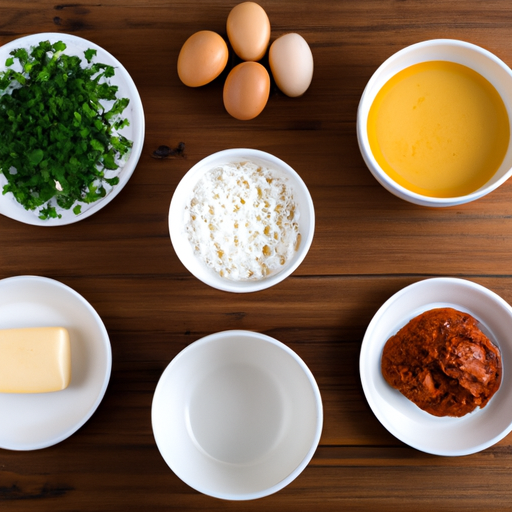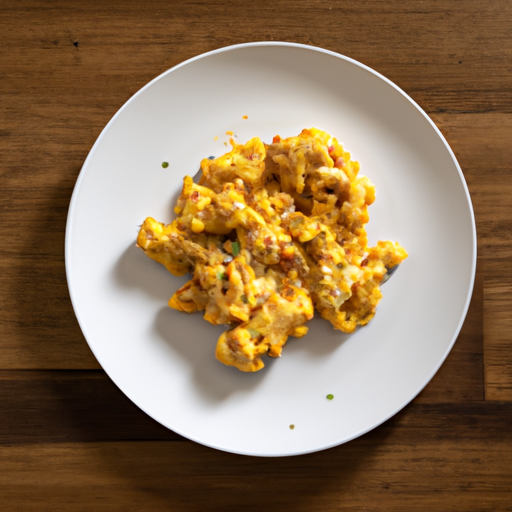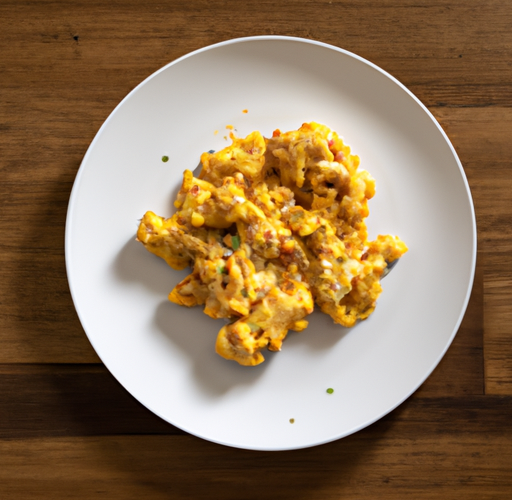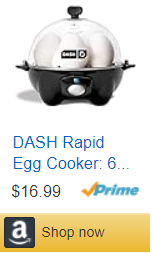Hello there and welcome to Omelette Recipes! Today, I’d like to share with you a delicious and easy-to-make dish: Korean Scrambled Eggs. This savory dish is perfect for breakfast, lunch, or dinner and is packed with flavor. With just a handful of ingredients, you can whip up this quick and tasty meal in no time. So, let’s get started! We’ve made this korean scrambled eggs recipe easy to follow 👨🍳.

Ingredients
- 6 eggs
- 1 tablespoon butter
- 1 tablespoon vegetable oil
- 2 tablespoons milk
- 2 tablespoons gochujang
- 2 scallions, thinly sliced
- Salt and pepper, to taste
Instructions
- Whisk together 6 eggs, 2 tablespoons milk, salt, and pepper until the mixture is smooth.
- Heat 1 tablespoon butter and 1 tablespoon vegetable oil in a nonstick skillet over medium heat.
- Add 2 thinly sliced scallions and cook for 1-2 minutes until soft.
- Pour in the egg mixture and stir gently with a spatula.
- Allow the eggs to cook for 1-2 minutes without disturbing them.
- Use the spatula to move the set edges towards the center of the pan, allowing the uncooked eggs to flow underneath.
- Add 2 tablespoons of gochujang and continue stirring until the mixture is creamy and fluffy.
- Remove from the heat.
- Serve hot with rice, toast, or your favorite sides.

How long does korean scrambled eggs last in the fridge?
Korean scrambled eggs can typically be stored in the refrigerator for up to three to four days after cooking. However, it is important to properly store the eggs in an airtight container to maintain their freshness and prevent contamination. Before storing the eggs, allow them to cool down to room temperature and then transfer them to a container with a lid. It is also recommended to label the container with the date of preparation to keep track of their shelf life. When reheating the eggs, it is best to do so in the microwave or on the stove on low heat to prevent overcooking and maintain their texture and flavor.
Low calorie korean scrambled eggs recipe substitutions
To make this Korean-style scrambled eggs recipe lower calorie, here are some possible substitutes: instead of using 1 tablespoon of butter and 1 tablespoon of vegetable oil for cooking, you could use a non-stick cooking spray or reduce the amount of oil to 1 teaspoon. You could also use low-fat or skim milk instead of whole milk and reduce the amount of gochujang to 1 tablespoon or less, depending on personal preference. Another option is to use egg whites or egg substitute instead of the whole eggs, which will significantly lower the calorie count. Additionally, you could serve the eggs with fresh vegetables such as sliced tomatoes, cucumber, or steamed broccoli instead of bread and rice to further reduce the calorie intake.
What to serve with a korean scrambled eggs?
Korean scrambled eggs can be a delicious and nutritious breakfast or snack that is packed with protein and flavor. Some great side dishes to serve with this dish are steamed rice, kimchi, seaweed salad, or roasted vegetables like zucchini and mushrooms. You can also add some sliced avocado or fresh herbs like cilantro or green onions for extra flavor and color. Serve this meal with a cup of hot green tea or coffee to complete the experience.
Whats the best sauce for a korean scrambled eggs?
The best sauce for Korean scrambled eggs is a simple but flavorful combination of soy sauce, sesame oil, and green onions. Start by whisking together 2 tablespoons of soy sauce, 1 tablespoon of sesame oil, and 2 finely chopped green onions. Once the eggs are scrambled, drizzle the sauce over the top and mix well to coat the eggs. The savory umami flavors from the soy sauce pair perfectly with the nuttiness of the sesame oil and the fresh bite of the green onions to create a delicious complement to the eggs. Enjoy!
Korean scrambled eggs health benefits
Korean scrambled eggs are a great source of protein and healthy fats. The addition of vegetables like spinach, scallions, and carrots can provide essential vitamins and minerals. However, if you’re looking for a different recipe that would be healthier, you may want to try making an egg white omelette instead. Egg whites are low in cholesterol and calories and are a great source of protein. Adding mixed veggies like mushrooms, bell peppers, broccoli, and onions can help boost the nutritional value even further.
Post | Title | Ratings | Link |
 | Turkey and Cheese Omelette | ||
 | Goat Cheese and Tomato Omelette | ||
 | Tomato and Mozzarella Omelette |
















